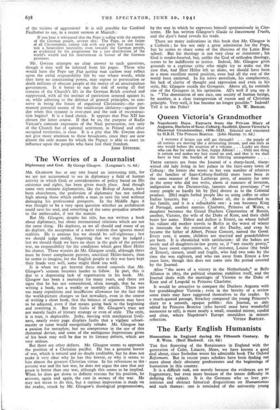The Worries of a Journalist
Diplomacy and God. By George Glasgow. (Longman's. 7s. 6d.)
MR. GLASGOW has at any rate found an interesting title, for we are not accustomed to see in diplomacy a field of human activity in which God, or considerations of policy based on His existence and rights, has been given much place. And though some very eminent diplomatists, like the Bishop of Autun, have been churchmen, the profession of diplomacy has not ;anked high among those which enable a man to save his soul without damaging his professional prospects. In the Middle Ages it was thought to be a very open question whether an archdeacon could save his soul, and something of the same prejudice attaches to the ambassador, if not the nuncio.
But Mr. Glasgow, despite his title, has not written a book about diplomacy, but about international relations which are not the same thing. He deplores, as we all should and many of us do deplore, the acceptance of a naive realism that ignores moral realities. He is anxious lest we should be self-righteous ; lest we should judge rashly, forgetting that we may be judged ; lest we should think we have no share in the guilt of the present war, no responsibility for the conditions which gave Herr Hitler his chance. These worries do Mr. Glasgow credit, although there must be fewer complacent patriots, uncritical Hitler-haters, than he seems to imagine, for the English people in this war have kept their heads very well, some might think too well.
It is when we get beyond these moral counsels that Mr. Glasgow's sermon becomes harder to follow. In part, this is due to a depressing lack of organisation in his book. Mr. Glasgow has been a journalist for many years, and there are signs that he has not remembered, often enough, that he was writing a book, not a weekly or monthly article. There are too many repetitions and insufficient allowance for the fact that the world-picture changes so fast nowadays, even in the course of writing a short book, that the balance of argument may have to be adjusted, even if that means going back to the beginning and rewriting it. But the faults of Mr. Glasgow's tract are not merely faults of literary strategy or even of style. The style, it is true, is deplorable. Jerky, moving with mechanical liveli- ness, nearly every page displays faults that a vigilant school- master or tutor would energetically rebuke. Mr. Glasgow has a passion for metaphor, but no competence in the use of this rhetorical device, and some of the ambiguous impressions given of his book may well be due to its literary defects, which are very serious. But there are other defects. Mr. Glasgow seems to approach the position of a Christian pacifist. He has a genuine horror of war, which is natural and no doubt creditable, but he does not make it very clear why he has this horror, or why it seems to him almost the greatest Christian virtue. In his references to the present war and the last war, he does not argue the case that any peace is better than any war, although this seems to be implied. When he does get down to definite reasons for his position, he stresses, again and again, the cost in money of the war. He may not mean to do this, but a curious impression is made on the reader, struck by Mr. Glasgow's theological prepossessions, by the way in which he expresses himself spontaneously in City- terms. He has written Glasgow's Guide to Investment Trusts, and the dyer's hand reveals his trade.
There are many indications in this book that Mr. Glasgow is a Catholic ; he has not only a great admiration for the Pope, but he seems to share some of the illusions of the Latin Bloc school. But his theology is not very clear or consistent ; his God is tender-hearted, but, unlike the God of orthodox theology, seems to be indifferent to justice. Indeed, Mr. Glasgow gives grounds to a captious critic who might try to make out the case that, had Herr Hitler left us alone, we should have been in a most excellent moral position, even had all the rest of the world been enslaved. In his naive moralism, his complacency, his lack of clarity of thought and expression and even in his style, Mr. Glasgow recalls the Groupers. Above all, he reminds one of the Groupers in his optimism. All's well if you say it is. " The domination of one race, one society of human beings, by another, is a cleat transgression of reason and of Christian principle. Very-well, it has become no longer possible." Indeed?


























 Previous page
Previous page